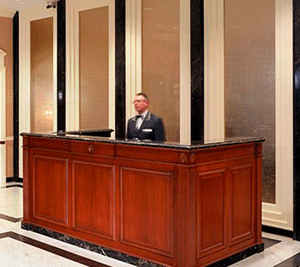BY MICHELE HERMAN | I’m a member of my building’s co-op board, and I just learned something interesting about lobby renovations. The going rate for a new lobby desk is in the low five figures.
When I asked what seemed like a reasonable question — Isn’t that kind of a lot for a desk? — I was assured by my fellow board members, all savvy professionals in their various fields, that this was more than a fair price for a desk. After all, it’s going to be handcrafted. It’s going to be big. It’s going to be wired for various things.
I didn’t ask a follow-up question about the desk, because asking the first one made me feel like an out-of-touch, pound-foolish cheapskate. Who am I to complain about such details when we’re going to get a gorgeous new lobby that will make us even more desirable to buyers than we already are?
Our co-op has historically been loath to assess for improvements unless absolutely necessary, but lately I’m hearing a different sentiment. Apparently, many co-ops assess all the time, sometimes for months or years on end, and it’s folly for shareholders to expect improvements for free. I hear this a lot: Our main obligation to the shareholders is to maximize their investment.
People in the Village didn’t used to talk this way. “Monetize” is one of the words that’s always hovering in such conversations, bound to spill out (the way “stewardship” spills out in conversations about land conservation). When I hear the word “monetize,” I always have to stop and think: Where did this obscure term that used to mean “to coin or legalize as money” come from and when did everyone agree on its new meaning, which I gather is this: to take something that isn’t money and turn it into money.
I got up the next morning and thought maybe I’d hallucinated the last zero on the price tag for the desk. The smaller number, frankly, seemed like it ought to buy, if not a large, handcrafted, wired desk, at least a good chunk of one. But I went back and checked the proposal and it was still there with all its zeroes, lined up with the other equivalent amounts for other fixtures, amounts I would be shortsighted and silly to grouse about, given how much these changes will enhance the value of my apartment.
Increasingly, I feel I live in a parallel universe. Or I live in the same old universe, but a new one has materialized around it. It’s a place paved with slabs of stone and exotic but sustainable woods in neutral tones and so many BTUs in the gas jets you’d think the stoves would up and fly to Sydney.
My apartment, on the other hand, has whatever it came with 25 years ago except for the things that broke and had to be replaced. It has standard chrome towel racks and faucets and honey-oak floor boards with the original floor guy’s bootprint still sealed in the polyurethane. Every time one of us walks by the kitchen cabinet with the balky hinge, we push the door in so it lines up with its mate.
In my universe, things are rarely perfect, and we don’t expect them to be. It’s nonetheless a very comfortable universe, particularly when compared to the way the vast majority of people live in this city and on planet Earth. Nearly every day I survey my living room and, even with the hand-me-downs and the frayed upholstery and the track lights that run on an obsolete style of track and have needed a good dusting for, oh, two decades now, I feel nothing but gratitude. (I also think it’s just a matter of a decade or so before the slabs of stone start to seem so ’10s and our ’80s-era fixtures rise to the level of “vintage.”)
The term for things like five-figure desks is “high end.” We live in a newly high-end block in a newly high-end neighborhood that’s about to ratchet up even higher, if that’s possible, with the opening of the Whitney Museum. “High end,” I believe, describes a price point (and presumably but not necessarily a level of quality), but it’s also a style. I see it as the decorating equivalent of Daisy Buchanan’s voice: It’s full of money. Like its relative “upscale,” it implies a ladder that one climbs to the top of and doesn’t come down from.
The other day I saw the new food court in the Winter Garden, where the Gap used to be, and there it was again: the expanses of white, the planks of exotic wood, the neutral tones, the high-end barbecue, the high-end bagels.
What did we used to say instead? “Fancy.” But fancy tilted slightly toward the comical, implying flourishes and trimming and pretension. At some point, the noun “luxury” became an adjective, describing purring motors and wall-to-wall carpeting. But both terms connote a special treat rather than a way of life.
Things do grow shabby and some things grow obsolete, especially in a time when technology is proliferating faster than the real need for it. It makes sense to replace worn-out things with high-quality ones that will last. After all, the cost will be amortized across many years and many apartments. The outlay is small, even negligible. I get all that. What concerns me is the constant escalation, the idea that it’s always sound fiscal policy to upgrade, and that “keeping up with the Joneses” is seen not as a bromide but as a co-op’s duty.
I like my fellow board members and I believe they have the interests of our community at heart; it’s just that I think of our community as primarily a civic and social one and they see it as primarily a financial one.
So I would like to offer this post-mortem to our old desk. It was custom-made too, pro bono by a cabinetmaker who lives in the building. I first saw it when I was living — quite comfortably — a block away in a building so cut-rate it didn’t even have a desk. I remember thinking the desk, which was new then, was pretty fancy.
It’s small and made of oak, with a quirky shape and many compartments, and its only technology is a hidden light bulb that our previous doorman used to set his egg sandwich on to keep it warm. Until it grew old and shabby — shabby in its own right and shabby when compared to the high-end desks in the three new buildings on the block — and one of its handles came loose, I thought it did a perfectly good job of being a desk. It made an admirable home for the doorman, the logbook, the paper towels and the doggy treats. Kids sometimes sat on it and no one minded. It was a Village sort of desk.


















